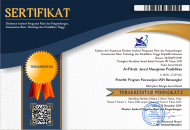Factors Influencing Islamic Education: Government Policy, Principals and Teachers
Abstract
Keywords
Full Text:
PDFReferences
Asbar, AM, & Setiawan, A. (2022). Values of Aqidah, Worship, Sharia and Al-Dharuriyat Al-Sittah As Normative Basics of Islamic Education. Al-Gazali Journal of Islamic Education, 1(01), 87–101.
Assingly, MS (2021). Educational Research Methods (Guidelines for Writing Scientific Articles and Final Projects). K-Media Publisher.
Budiman, S., & Suharto, AWB (2021). Philosophy of Islamic education in the perspective of physical education. JISIP (Journal of Social Sciences and Education), 5(3).
Fahrisi, A. (2020). Spiritual Intelligence and Islamic Education. MEDIA SPACE.
Handoko, T. (2019). The Principal's Efforts in Improving the Performance of MTs Muhammadiyah Metro Teachers.
Kurniawan, A., Mahmud, R., Rahmatika, Z., Mustofa, M., Jumini, S., Winarti, P., Puling, D., Magalhaes, ADJ, Pane, EP, & Maksum, MNR (2022) . Fundamentals of Educational Sciences. Global Technology Executive.
Martin, R., & Simanjorang, MM (2022). The Importance of the Role of an Appropriate Curriculum in Education in Indonesia. Proceedings of Basic Education, 1(1), 125–134.
Mubin, MN (2021). Islamic Religious Education Online Learning During the Covid-19 Pandemic in Middle Schools. HEUTAGOGIA: Journal of Islamic Education, 1(1), 16–31.
Musfianawati, M. (2022). The Impact of Underage Marriage on the Continuity of Children's Education in the Family. RECHTENS JOURNAL, 11(1), 95–108.
Nurfai, A. (2022). Gender Equality Education In Islamic Boarding Schools as an Effort to Build a Nation's Civilization. Insight: Journal of Education and Training Center for Religious Education, Jakarta, 3(2), 213–227.
PRINCESS, A. (2022). Internalization Of Character Values In Implementing Pai Learning Online At Sd Islam Assalam Sukarame Bandar Lampung.
Ridwan, IM (2020). Harmony, Disharmony, and Integration Between Science and Religion. Indonesian Journal of Philosophy, 3(1), 8–13.
Rusli, M. (2021). Designing Basic/Descriptive Qualitative Research and Case Studies. Al-Ubudiyah: Journal of Islamic Education and Studies, 2(1), 48–60.
Saihu, M. (2022). Human Existence as Khalifah and Its Implementation in Islamic Education. Andragogy: Journal of Islamic Education and Management of Islamic Education, 4(02), 400–414.
Sari, RS, & Suhaili, NY (2020). Talent on Student Learning Motivation in the Learning and Learning Process. Encyclopedia of Journal, 3(1), 140–147.
Sarosa, S. (2021). Qualitative Research Data Analysis. Pt Kanisius.
Simarmata, J., Chaerul, M., Mukti, RC, Purba, DW, Tamrin, AF, Jamaludin, J., Suhelayanti, S., Watrianthos, R., Sahabuddin, AA, & Meganingratna, A. (2020). Information Technology: Applications and Applications. Our Writing Foundation.
Sinar, S. (2022). Pedagogic Competency Map of Elementary Islamic Religious Education Teachers in Mastering Student Characteristics. Journal of Education and Counseling (JPDK), 4(6), 8893–8902.
Siregar, TH (2019). Islamic Religious Education (PAI) Learning Innovation at State Elementary School 130004, Pematang Pasir Subdistrict, Tanjungbalai City.
SONATA, DP (2021). The Influence Of Self-Efficiency, Family Support, And Future Orientation On Career Decision Making To Be A Teacher (Survey of Economic Education Students Class of 2016 Siliwangi University).
Suartama, IK (n.d.). Education Of Elementary School Teachers Department Of Educational Sciences Faculty Of Educational Sciences Universitas Pendidikan Ganesha.
Suroso, S. (2023). Analysis of Principal Academic Supervision in Improving Teacher Learning Performance. JIIP-Journal of Scientific Education, 6(2), 1164–1168.
Susilawati, N. (2021). Free Learning and Free Campus in the View of Philosophy of Humanism Education. Sikola Journal: Journal of Education and Learning Studies, 2(3), 203–219.
Triputra, DR, & Pranoto, BA (2020). Student perceptions of Islamic moderation-based PAI learning implementation in counteracting intolerance and radicalism. Annizom, 5(3).
Trisniawati, UM (2021). Implementation of Blended Learning during the Covid-19 pandemic in increasing Class VII students' interest in learning Fiqh at MTs Al-Muslimun Lamongan.
Uno, HB, & Umar, MK (2023). Managing intelligence in learning: A concept of intelligence-based learning. Script Earth.
Wibowo, A., & Subhan, AZ (2020). Madrasa principal's strategy in improving the quality of education. Indonesian Journal of Islamic Educational Management, 3(2), 108–116.
Yaqin, A. (2021). Multi-Cultural Education. Script Rainbow Painting.
Zuhri, S., Fajriah, N., Wibowo, RTH, Prakoso, AAD, Indriani, RO, Windari, AT, Thomas, C., Auliya, AZ, Annisa, M., & Yusuf, M. (2020). Mass Communication Theory and Societal Change (Vol. 5). Communication Studies Study Program, University of Muhammadiyah Malang, in collaboration with ….
DOI: http://dx.doi.org/10.31958/jaf.v11i1.8697
Refbacks
- There are currently no refbacks.
Copyright (c) 2023 Taufik Abdillah Syukur, Tania Putri Anhary, Habel S.J. Rieuwpassa

This work is licensed under a Creative Commons Attribution-NonCommercial 4.0 International License.
__________________________________________________________________________
 | Al-Fikrah: The Journal of Educational Management |
Creations are disseminated below Lisensi Creative Commons Atribusi-NonKomersial 4.0 Internasional.













